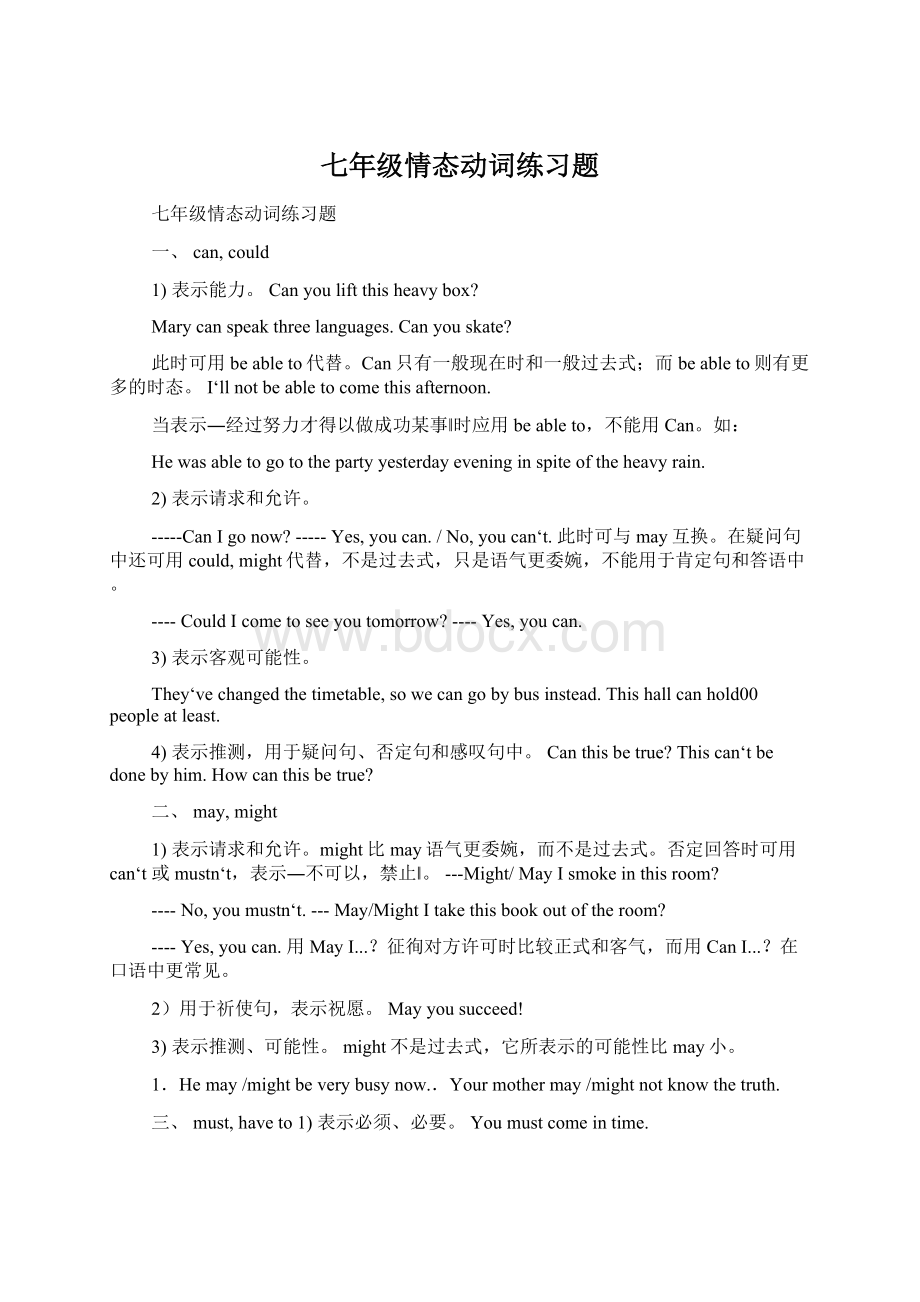七年级情态动词练习题Word格式.docx
《七年级情态动词练习题Word格式.docx》由会员分享,可在线阅读,更多相关《七年级情态动词练习题Word格式.docx(16页珍藏版)》请在冰豆网上搜索。

在口语中更常见。
2)用于祈使句,表示祝愿。
Mayyousucceed!
3)表示推测、可能性。
might不是过去式,它所表示的可能性比may小。
1.Hemay/mightbeverybusynow..Yourmothermay/mightnotknowthetruth.
三、must,haveto1)表示必须、必要。
Youmustcomeintime.
在回答引出的问句时,如果是否定的,不能用mustn‘t,而用needn‘t,don‘thaveto.----Mustwehandinourexercisebookstoday?
----Yes,youmust.
----No,youdon‘thaveto/youneedn‘t.
2)must是说话人的主观看法,而haveto则强调客观需要。
Must只有一般现在时,haveto有更多的时态形式。
1.heplayisn‘tinteresting,Ireallymustgonow..IhadtoworkwhenIwasyourage.
3)表示推测、可能性
1.You‘reTom‘sgoodfriend,soyoumustknowwhathelikesbest.
2.Yourmothermustbewaitingforyounow.
四、dare,need
1)dare作情态动词用时,常用于疑问句、否定句和条件从句中,过去式形式为dared。
1.HowdareyousayI‘munfair?
.Hedaren‘tspeakEnglishbeforesuchacrowd,darehe?
3.Ifwedarednotgotherethatday,wecouldn‘tgetthebeautifulflowers.
2)need作情态动词用时,常用于疑问句、否定句。
在肯定句中一般用must,haveto,oughtto,should代替。
1.Youneedn‘tcomesoearly..----NeedIfinishtheworktoday?
----Yes,youmust./No,youneedn‘t.
3)dare和need作实义动词用时,有人称、时态和数的变化。
在肯定句中,dare后面常接带to的不定式。
在疑问句和否定句中,dare后面可接带to或不带to的不定式。
而need后面只能接带to的不定式。
1.Idaretoswimacrossthisriver..Hedoesn‘tdareanswer..Heneedstofinishhishomeworktoday.
五、shall,should
1)shall用于第一人称,征求对方的意见。
Whatshallwedothisevening?
2)shall用于第二、三人称,表示说话人给对方的命令、警告、允诺或威胁。
1.Youshallfailifyoudon‘tworkhard..HeshallhavethebookwhenIfinishit.
3.Heshallbepunished.
六、will,would
1)表示请求、建议等,would更委婉。
Will/Wouldyoupassmetheball,please?
2)表示意志、愿望和决心。
1.Iwillneverdothatagain..Theyaskedhimifhewouldgoabroad.
3)would表示过去反复发生的动作或某种倾向。
would表示过去习惯时比usedto正式,且有―现已无此习惯‖的含义。
1.Duringthevacation,hewouldvisitmeeveryotherday..Thewoundwouldnotheal.
4)表示估计和猜想。
Itwouldbeaboutteno‘clockwhenshelefthome.
七、should,oughtto1)should,oughtto表示―应该‖,oughtto表示义务或责任,比should语气重。
1.Ishouldhelpherbecausesheisintrouble..Yououghttotakecareofthebaby.
2)表示劝告、建议和命令。
should,oughtto可通用,但在疑问句中常用should。
1.Youshould/oughttogotoclassrightaway..ShouldIopenthewindow?
3)表示推测
should,oughtto,must。
1.Hemustbehomebynow.
2.Heoughtto/shouldbehomebynow..Thisiswheretheoilmustbe.
4.Thisiswheretheoiloughtto/shouldbe.
情态动词can表示能力,意为―能会‖
表示推测,意为―可能‖,常用于否定句和疑问句中
表示请求,允许,意为―可以‖
couldcan的过去式,意为―能、会‖,表示过去的能力
在疑问句中表示委婉请求
may表示请求、许可,意为―可以‖
表示推测,常用于肯定句中,意为―可能、也许‖
mightmay的过去式
表示推测,常用于肯定句中,意为―可能、也许‖
must表示主观看法,意为―必须、应该‖
表示有把握的推测,用语肯定句
Need表示需要、必须,主要用于否定句和疑问句中
dare表示敢于,主要用于否定句和疑问句中
should意为―应该‖,表示要求和命令
表示劝告、建议
hadbetter意为―最好‖,表示建议
usedto意为―过去常常,表示过去的动作、行为
考点知识清单
知识梳理
情态动词有具体的词义,但也同助动词一样,需要与其他词语一起构成句子的谓语,另外情态动词没哟人称和数的变化,情态动词后必须跟动词原形。
考点一can,may,must等情态动词在陈述句中的用法
1.can的用法
表示能力、许可、可能性。
表示能力时一般译为―能、会‖,即有种能力,尤其是生来具备的能力,此时may和must均不可代替它。
Shecanswimfast,butIcan‘t.她能游得很快,但我不能。
Icanseewithmyeyes.我用眼睛看。
表示可能、能够。
如:
Icanfinishitinanhour.我能在一小时后完成它。
表示许可,常在口语中。
Youcanusemydictionary.你可以用我的字典。
表示推测,意为―可能‖,常用于否定句和疑问句中,此时can‘t译为―不可能‖。
Canthenewsbetrue?
这个消息会是真的吗?
----Canitbeourteacher?
那个人有可能是我们老师吗?
----No,itcan‘tbeourteacher.HeisonavisittotheGreatWall.
不可能。
咱们老师正在游览长城呢。
例---IthinkMissGaomustbeinthelibrary.Shesaidshewouldgothere.
-----No.She__bethere,Ihavejustbeenthere.
A.can‘tB.mustn‘tC.needn‘tD.wouldn‘t
[解析]
根据下文―我刚去过那儿‖可知,应为―不可能‖,can‘t表示推测
[答案]A
2.could的用法
can的过去式,意为―能、会‖,表示过去的能力。
Hecouldwritepoemswhenhewas10.他十岁时就会写诗。
could在疑问句中,表示委婉的语气,此时could没有过去式的意思。
如:
Couldyoudomeafavour?
你能帮我个忙吗?
---CouldIuseyourpen?
我能用一下你的钢笔吗?
--Yes,youcan.可以。
3.may的用法
表示请求、许可,比can正式,如:
MayIborrowyourbike?
我可以借你的自行车吗?
Youmaygohomenow.现在你可以回家了。
例----_______IborrowyourMP3?
-----Sure.Hereyouare.
A.MayB.ShouldC.MustD.Would
在此处表示请求,意为―做……可以吗‖。
答案A
表示推测,谈论可能性,意为―可能,或许‖,一般用于肯定句中。
Itmayraintomorrow.明天可能会下雨。
Shemaybeathome.她可能在家呢.
may的过去式为might,表示推测时。
可能性低于may。
Heisawayfromschool.Hemightbesick.
他离开学校了,可能是他生病了。
4.must的用法
must表示主观看法,意为―必须、一定‖。
YoumuststayhereuntilIcomeback.
在我回来之前你必须呆在这儿。
MustIhandinmyhomeworkrightnow?
我必须现在交作业吗?
其否定形式mustn‘t表示―一定不要‖―千万别‖―禁止,不许‖.如:
Youmustn‘tplaywithfire.你不许玩火。
Youmustn‘tbelate.你一定不要迟到。
对must引导的疑问句,肯定回答为must,否定回答为needn‘t或don‘thaveto.
---MustIfinishmyhomework?
我现在必须完成作业吗?
---No,youneedn‘t.
不,你不必。
must表示有把握的推测,用于肯定句。
Thelightison,sohemustbeathomenow.
灯亮着,他现在肯定在家。
注意其反意问句的构成形式:
当must表示肯定的判断、推测时,其反意疑问句要用实际问句的助动词来构成。
Shemusthavefinishedwriting,hasn‘tshe?
她一定已经写完了,不是吗?
5.need的用法
need表示需要、必须,主要用于否定句和疑问句中,其否定形式为needn‘t,意为―没有必要,不必‖。
用need提问时,肯定回答为must,否定回答为needn‘t。
----NeedIstayhereanylonger?
我还有必要留在这儿吗?
----Yes,youmust.是的。
-----No.youneedn‘t.不,你不必。
need还可以作实义动词,此时有人称、数和时态的变化,后边多接动词不定式。
Ineedtodoitrightnow.我需要马上做这件事。
Heneedstolearnmoreaboutthegirl.他需要多了解那个女孩。
6.dare的用法
dare意为―敢、敢于‖,用法近似于need,有两种词性:
dare作为情态动词,多用于否定句、疑问句或条件句中,无第三人称单数形式,只有一般现在时和一般过去时。
Darehetellthemwhatheknows?
他敢告诉他们所知道的情况吗?
Idaren‘taskher–willyoudoitforme?
我可不敢问她,你能帮我问问吗?
dare作为实义动词,此时有人称、数及时态的变化。
Hedoesn‘tdaretobreakhispromise.
他不敢食言。
注意:
在口语中,dare的各种形式常与不带to的不定式连用。
DoyoudaretellherwhatIsaid?
你敢告诉她我说的话吗?
Ididn‘tdarelookathim.
我不敢看他。
7.shall的用法
shall表示征求对方意见,如:
Shallwegooutforawalk?
我们出去散步好吗?
表示决心、警告、命令,如:
Nooneshallbringyourbeepersormobilephonesintheexam.
考试中任何人不准带BP机和手机。
8.should的用法
should意为―应该‖,可表示劝告、建议、义务、责任等。
Weshouldprotecttheenvironment.我们应该保护环境。
shouldliketodosth.表示―想要、愿意做某事‖,常用于口语中。
Ishouldliketogowithyou.我愿意和你一起去。
Wouldyouliketogowithme?
你想和我一起去吗?
Shouldhavedone表示对过去动作的责备、批评。
Youshouldhavefinishedyourhomework.
你应该已经完成作业了。
9.will的用法
will表示意愿、意志、打算,可用于多种人称。
IwillhelpyouifI‘mfreethisafternoon.
今天下午如果我有空,我就会帮你。
10.hadbetter的用法
hadbetter意为―最好‖,没有人称的变化,后面接不带to的不定式,其否定形式为:
hadbetternot。
Wehadbettergonow.我们最好现在就走。
Youhadbetternotgivethebooktohim.
你最好不要把这本书给他。
考点二含有情态动词的疑问句
1.由can、may、must构成的疑问句
句式:
Can/May/Must…+主语+动词原形+….?
Canyourepairthecar?
你会修小汽车吗?
Couldhebeagoodstudent?
他能是名好学生吗?
MayIborrowyourruler?
我可以借你的尺子吗?
Mustwecleantheroomnow?
我们必须现在打扫房间吗?
对may引出的问句,可以有下列回答方式:
Yes,ofcourse.
Yes,certainly.
Sure.
No,youmustn‘t.
No,youcan‘t.
对must引出的疑问句,回答方式为:
Yes,…must.
No,…needn‘t/don‘thaveto.
2.will,would,shall的用法
will在一般疑问句中表示客气的―请求、劝说‖。
would是will的过去式,语气更加客气、委婉。
Wouldyoushowmeyourpicturebook?
你能让我看看你的画册吗?
Willyoupleasegivemeacall?
请给我打个电话好吗?
对will/wouldyou…的回答方式有以下几种:
Yes,Iwill.
Sure.
Allright.
Certainly.
Yes,please.
例---WouldyoudomeafavourandpassonmythankstoLily?
-----________.
A.That‘srightB.WithpleasureC.Itdoesn‘tmatterD.Notrouble
解析A.意为―对了‖,B.意为―乐意效劳‖,C.意为―没关系‖D.意为―不费事‖。
答案B
初一情态动词练习题
1
1Tom___cometoseeustonight,butheisn’tverysureyet.
A.mayB.canC.hastoD.must
They___dowellintheexam.
A.canbeabletoB.beableto
C.canabletoD.areableto
-MayItakethisbookout?
-No,you___.
A.can’tB.maynotC.needn’tD.aren’t
You___goandseeadoctoratoncebecauseyou’regotafever.
A.canB.mustC.dareD.would
-CanyouspeakJapanese?
-No,I____.
A.mustn’tB.can’tC.needn’tD.maynot
2
1-He___beintheclassroom,Ithink.
-No,he___beintheclassroom.Isawhimgohomeaminuteago.
A.can;
maynotB.must;
maynotC.may;
can’tD.may;
mustn’t
-ShallIgetonemorecakeforyou,Dad?
-Thanks,butyou___,I’vehadenough.
A.maynotB.mustnotC.can’tD.needn’t
Heisn’tatschool.Ithinkhe___beill.
oA.canB.shallC.mustD.hasto
___Itakethisone?
A.MayB.WillC.AreD.Do
3
1Thechildren___playfootballontheroad.
A.can’tB.canC.mustn’tD.must
You___belateforschoolagainnexttime.
A.mustn’tB.needn’t
C.don’thavetoD.don’tneedto
-MustIdomyhomeworkatonce?
A.needn’tB.mustn’tC.can’tD.maynot
4
1Hisarmisallright.He___goandseethedoctor.
A.hasnottoB.don’thaveto
C.haven’ttoD.doesn’thaveto
Hehadtogiveuptheplan,___he?
A.didB.didn’tC.doesD.doesn’t
Theyhadtowalkhere,___they?
A.mustn’tB.didC.didn’tD.hadn’t
5
1Hehadbetterstayhere,___he?
A.didn’tB.don’tC.hadn’tD.isn’t
You’dbetter___latenexttime.
A.nottobeB.notbeC.won’tbeD.don’tbe